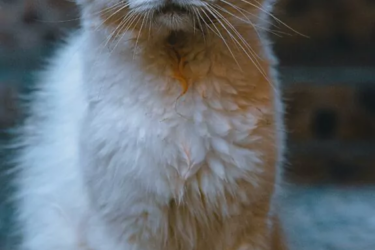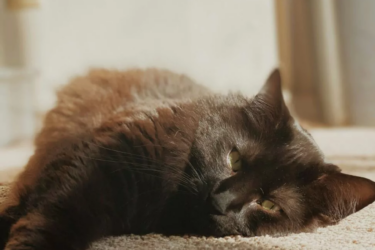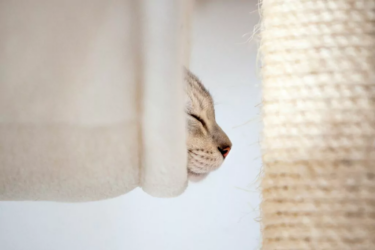
Lykoi cats love people. And they are smart. But the most striking thing about this breed of cat is their coat. That’s why they resemble little wolves. Adorable, but that’s why they are banned in the Netherlands. Discover everything about the Lykoi in this blog.
In this blog, we’ll tell you exactly what you want to know about Lykoi cats, such as:
- What is the character of a Lykoi cat?
- The appearance and coat of a Lykoi
- How to care for a Lykoi?
- How long does a Lykoi live?
- Health problems of Lykoi cats
- The origin of the Lykoi
- Buying a Lykoi (kitten)
And we’ll also tell you:
- What is a wolf cat?
What is the character of a Lykoi?
Lykoi cats are affectionate and sweet. They are also playful and have a lot of energy. They don’t mind visitors and other strangers in the house, but they can be a bit shy, maybe even a little aloof at first. They are very attached to their own owners and fellow felines and can seek refuge behind them when there are visitors.
A Lykoi is also remarkably intelligent – this cat easily solves cat puzzles, strange obstacles, and problems on its own. And this cat breed loves to play as well. Lykoi cats enjoy the company of their humans, but they can also entertain themselves quite well. Because it’s recommended to keep Lykoi cats indoors, a good indoor cat scratching post is a must. It’s a place where a cat can fulfill all its natural behaviors – scratching, climbing, and jumping.
A Lykoi can be a bit shy with strangers but very affectionate towards its owners!
The appearance and coat of a Lykoi
Lykoi kittens are born fully furred. But over time, their fur falls out to some extent. In the first few years, you’ll see this only on their belly and snout – this cat has no hair around its chin, nose, and eyes. These characteristics make Lykoi cats very popular because the combination with their dark – almost black – fur makes them look like little wolves.
So, a Lykoi is partially bald. And this baldness increases over the years, so most Lykoi cats eventually have no hair at all. This is the reason why this cat breed is banned in the Netherlands – their baldness makes them vulnerable to cold, sunburn, and skin diseases, such as cancer.
Lykoi cats may be bald, but they are not hypoallergenic!
In terms of size, Lykoi cats are average, although males are larger than females. Their ears are long, pointed, and wider than those of other breeds. The tail also looks different. In an average cat, the tail is as long as or longer than the body. But the tail of a Lykoi is much shorter!
Find trendy scratching posts for active cats here

How to care for a Lykoi?
Because a Lykoi cat is partially or completely bald, you might think they don’t need to be brushed often. But the opposite is true. Because they shed so much, you should gently brush them once or twice a week. Lykoi cats that are (almost) completely bald need to be bathed once a month or thoroughly washed. This keeps their bald skin free of dirt. They can also accumulate some oil around their nails and ears, so clean those areas regularly with a soft cloth.
And a Lykoi needs the same care as any other cat:
- Lots of love and attention
- Variety of toys
- Good nutrition
- Clean litter boxes
- Always fresh water
- Protection against parasites
- A safe home
- Cozy sleeping spots
- A sturdy scratching post
- Regular visits to the veterinarian for check-ups
How long does a Lykoi live?
Lykoi cats are very rare, so there is not much information available about their life expectancy. But it is estimated that, with proper care, they can live between 12 and 16 years.
Fun fact: A Lykoi cat is sometimes also called a Wolf Cat.
Health problems in Lykoi cats
There is not much information available about potential health problems in Lykoi cats either. This breed is relatively new, and there are very few cats of this breed in the world. The most well-known issue with these cats is their skin. Because they are partially or completely bald, they can develop skin diseases or skin cancer more easily. Lykoi cats should always be protected from the sun with a coat or special sunblock for cats.
If you have any doubts about your cat’s health, always consult a veterinarian and have your cat checked for kidney disease, heart issues, thyroid conditions, and FIP.
The origin of the Lykoi
Lykoi cats originated in the United States and without human intervention. In other words, their genes have not been manipulated, and kittens with these unique characteristics were born spontaneously. In 2011, two unrelated breeders brought together cats with these distinctive genes, and the first litter of Lykoi kittens was born. TICA granted this breed a registration status in 2012, but it doesn’t mean that Lykoi cats are allowed everywhere. In the Netherlands, breeding and keeping this breed are prohibited.

Buying a Lykoi (kitten)
Lykoi cats cannot be bred or kept in the Netherlands. Therefore, there is no known price. But in America, you can expect to pay $5,000 or more. However, this cat breed comes with its own set of problems. And, of course, you wouldn’t want that. So, please don’t buy a Lykoi, as it won’t benefit you or the little creature. If you still want a cat, there are plenty of healthy cat breeds available. You should acquire one from a reputable breeder with proper credentials, never from eBay, Marktplaats, or a backyard breeder. Alternatively, consider adopting from a shelter or through a mediation website, as there are many lovely cats waiting for a new home there!
The Lykoi in a nutshell:
- Lykoi cats are affectionate, intelligent, and sometimes a bit shy.
- A Lykoi is partially bald and has a dark coat.
- A Lykoi needs proper care and should be gently brushed 1 to 2 times a week.
- A Lykoi can live between 12 and 16 years if well cared for.
- Due to their rarity, little is known about the health of Lykoi cats, but it’s known that they can develop skin issues.
- Lykoi cats originate from America and have evolved naturally.
- You cannot buy a Lykoi kitten in the Netherlands because the breed is prohibited.
Disclaimer: Petrebels is not a veterinarian or a behavioral expert. All content, information, and tips on this blog are meant to inspire and provide information. If your cat has any issues or problems and you have doubts about your cat’s health, always consult a veterinarian or a behavioral expert.


